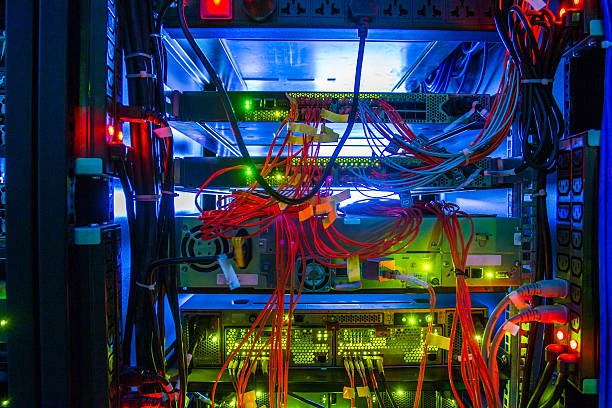Europe’s Industrial Titans Ride the Wave of the AI Boom
AI is not a mere tech buzz; it has become the chatter that describes a revolution gripping industries in European nations. For such firms as ABB Ltd, Siemens AG, Legrand SA, and Schneider Electric SE it will energize revenues and define new directions to create values. But where and how is this AI surge is influencing their revenues? But what does one anticipate as the future of these colossal industries? Let’s explore.
The AI Boom Lifts Industrial Giants
ABB, Siemens, Schneider Electric See Data-Center Orders Surge
In the recent past, there has been an eye-opening demand of data-centre propelled by the rise of Artificial Intelligence. Big names in the market including ABB, Siemens, Legrand, and Schneider electric have noted a sharp rise in orders for server racks, electrical equipment and cooling solutions. Nvidia Corp. and other companies that operate in the field of Artificial Intelligence are using these components needed to create quicker and more efficient computer models.
Newer accounts indicate that revenues from data centers have touched the echelon of €20 billion for the last year. This rise has provided a much-needed support to Europe’s industrial firms, to counter lower manufacturing revenue from Asia to North America.
Ways in which the AI boom affects the earnings of firms in various industries
Essentially, the impact of AI is not confined to the specialized sphere of technology only. In the manufacturing industry, technology, in particular, artificial intelligence, is bringing efficiency in the lines of production, cutting on costs, and adding value to the manufactured products. Profits are rising sharply due to the following uses of AI to advance financial services: risk and fraud examination and customer experience.
Healthcare is another sphere which benefits greatly from the AI developments. Ranging from predictive analysis to robotic surgeries, a world of difference is being brought in the patient care and internal functioning. These advancement have had a ripple effect and this can be evidenced by the increased earnings in the companies in these diverse sectors.
Risks for Companies Heavily Investing in AI Technologies

Fostering the AI boom that we have in front of us is both a majestic opportunity and an opportunity imbued with risk at its core. There is still a big question of the huge capital that is needed for the integration of artificial intelligence. Business investing heavily in AI technologies are exposed to potential of poor return on investment, given that the technology may underperform.
Also, there are some risks that are related to cyber threats to AI systems. Since critical infrastructures increasingly employ AI systems, the latter can be considered targets of cyberattacks. Implementing strong cybersecurity measures should be a top priority among companies that would like to protect their investment in AI systems.
Understanding how to capitalise on the AI Boom for sustainable development
To make the best of the AI wave, companies need to start strategizing. This includes resources for AI research, encouraging innovations, and training employees to be AI ready. In this way, companies can increase further their performance and guarantee them long-term profitability and competitiveness in the continuously changing market environment.
In addition, engagement with other AI startups and technological companies ensures that there is new ideas and faster growth. The formation of partnership and ecosystems to embrace the AI projects can foster development of growth strategies that can endure sustainable cycles.
Industries Seeing Significant Earnings Boost from AI Advancements
It is LIVE – the latest development in Artificial Intelligence is helping multiple industries clock phenomenal earning growths. In the automotive industry, artificial intelligence technologies such as self-driving cars are becoming the order of the day impacting on efficiency and generating new sources of income.
Gross is another industry that has vested itself in the benefits accruing from AI inventions. Customer targeting, inventory management with the focus on the efficient customer experience is boosting sales and customer retention. Several retailers or e-commerce firms are now using AI to forecast consumers’ buying habits to suit product or service delivery.
AI’s Influence on Job Markets and Employment Trends
We live in the era of Artificial Intelligence and all the existing and emerging industries show how it is changing job markets and possibilities for employment. For all the hype surrounding the threat of automation stealing our jobs, it is also an avenue for generating new ones in their wake. Business require knowledgeable specialists for designing and deploying AI frameworks and processes. This has resulted to increased demand of AI specialist, data scientist and any persons with good background in technology.

Also, AI is complementing human skills, in such a way that employees mainly concentrate on more complex tasks. These advances are putting pressure in the need to reskill and upskill in order to support the workforce within an AI environment.
The Role of AI Ethics in Shaping Future Earnings
AI ethics can therefore be used to predict future earnings of the affected corporates. Issues of data privacy, the potential for algorithmic bias, and, overall, issues of the transparency of the systems involved are of the utmost importance. Organization that adopt ethical practices in their AI systems gain credibility among the consumer, and this leads to a better brand image and improved viability in the future.
There are also emerging the regulatory frameworks, in order to embrace the issue of AI ethics. Those regulations thus serve as gospel to help organizations stay on the right side of the law so as to cover up or avoid any legal mishaps that would dent their reputations.
Small Businesses vs. Large Corporations in Adapting to the AI Boom
Small businesses and large corporations are experiencing the ai boom in two different ways. Business enterprises with huge capital investment can afford to spend a huge amount in the development of AI and related structures. They can use the advantages of greater business volumes and long-odded investments in R&D for developing new uses for AI.
At the same time, small businesses can have rather limited resources, but they are free to be as flexible and make decisions as quickly as needed. Even small business can employ AI solutions and acquire technology partners for its help without a need to invest a large sum of money.
The Future Consequences of Intelligence Advancement in the International Money Markets
The financial result of the AI boom is as far-reaching as it gets in the long term. Automation and robotics could account for 1. 2% of incremental global GDP by 2025, attributed to the productivity-sustaining abilities of Artificial Intelligence. By implementing AI, corporations stand to improve their competitiveness and hence gain part of the market and be more profitable.
However, there are some issues: challenges that may arise from changing the nature of work, such as job displacement, and income polarisation. This is a challenge that policymakers have to consider through special interventions like reskilling and social protection to foster effective economic growth.
Europe’s Rise as a Hub for Industrial Giants
The following factors explain why Europe has been in a position to transform into the place of massive industrial players. Sustained investment in engineering and manufacturing, well-developed infrastructure and emphasis on high technology have placed Europe in a vantage point in this industrial segment. Further, government policies and funding to research and development has provided a favourable atmosphere for the growth of the industries.
Maintaining Competitive Edge in the Global Market
Products markets in Europe show that the industrial giants sustain competitiveness through innovation and progression. Promoting the usage of the smart technologies such as Artificial Intelligence, Internet of Things and Industry 4. 0, enables such companies to keep on beating their counterparts all around the world. Such collaborations with research institutions and tech firms also increase their competitive advantage.
In this section of the report, the report will explore how the three value propositions can address sustainability and the impact on the environment.
Sustainability has arguably become one of the most important factors in Europe’s industrial behemoths. There is a growing trend of firms’ embracing the green culture and funding for renewables. Programs like carbon footprint cutting, circular economy, and sustainable procurement are essential to their plans.
It is namely stated that such companies contribute to the preservation of the environment at the same time as working on the brand image and promoting environmentally friendly products to people.
Impact of Digital Transformation on Europe’s Industrial Giants
Digitalisation has disrupted Europe’s industrial segment in a big way. This paper also reveals that digital integration has enhanced the organisational operations, productivity and facilitate the management through effectiveness decision support system. Digital transformation is taking hold of several key areas such as, IoT sensors, predict and plan maintenance methodologies, and digital twins as well.
Moreover, customer relations have also been improved through digitalization as it allows provision of what can be described as personified service delivery. Businesses that manage to achieve DX are in a better place to succeed in the current world economy.
Challenges in Innovation and Technology Adoption
However, their success stories have been receiving some hitches in their progress in innovation and technology. This primary concern also arises from such barriers such as legacy systems, organizational resistance to change, and lack of skills within an organization. To overcome such challenges, there is the need for culture change, training of the employees and use of agile concepts.
Cultural and Regulatory Differences Across Europe
Cultural and legal factors affecting manufacture across different countries in Europe remain hard-wired. Due to differences in business environment, customers, suppliers, and legislation firms have to adapt strategies. These differences are relevant to market penetration and further expansion, thus require due attention.
Research and Development in the Organization as a Factor of Success
The R & D is the key to success of Europe’s industrial giants. Investing in R&D drives innovation, enhances product offerings, and opens new market opportunities. Collaborations with academic institutions and tech startups further fuel R&D efforts, ensuring continuous progress and competitiveness.
Adapting to Shifts in Consumer Demands and Global Economic Trends
To remain relevant, Europe’s industrial giants must adapt to shifts in consumer demands and global economic trends. Understanding evolving customer preferences, leveraging data analytics, and staying attuned to market dynamics are essential. By aligning their strategies with these trends, companies can capture new growth opportunities and sustain their market leadership.
in short
The AI boom is a game-changer for Europe’s industrial giants, driving earnings growth, innovation, and competitiveness. However, navigating this landscape requires a strategic approach, ethical considerations, and adaptability to evolving trends. By leveraging AI technologies, fostering a culture of innovation, and prioritizing sustainability, these industrial behemoths can continue to thrive in the dynamic global market.
For businesses looking to harness the power of AI and drive sustainable growth, the time to act is now. Explore the potential of AI, invest in research and development, and stay ahead of the curve. The future belongs to those who embrace the AI revolution and seize the opportunities it presents.








